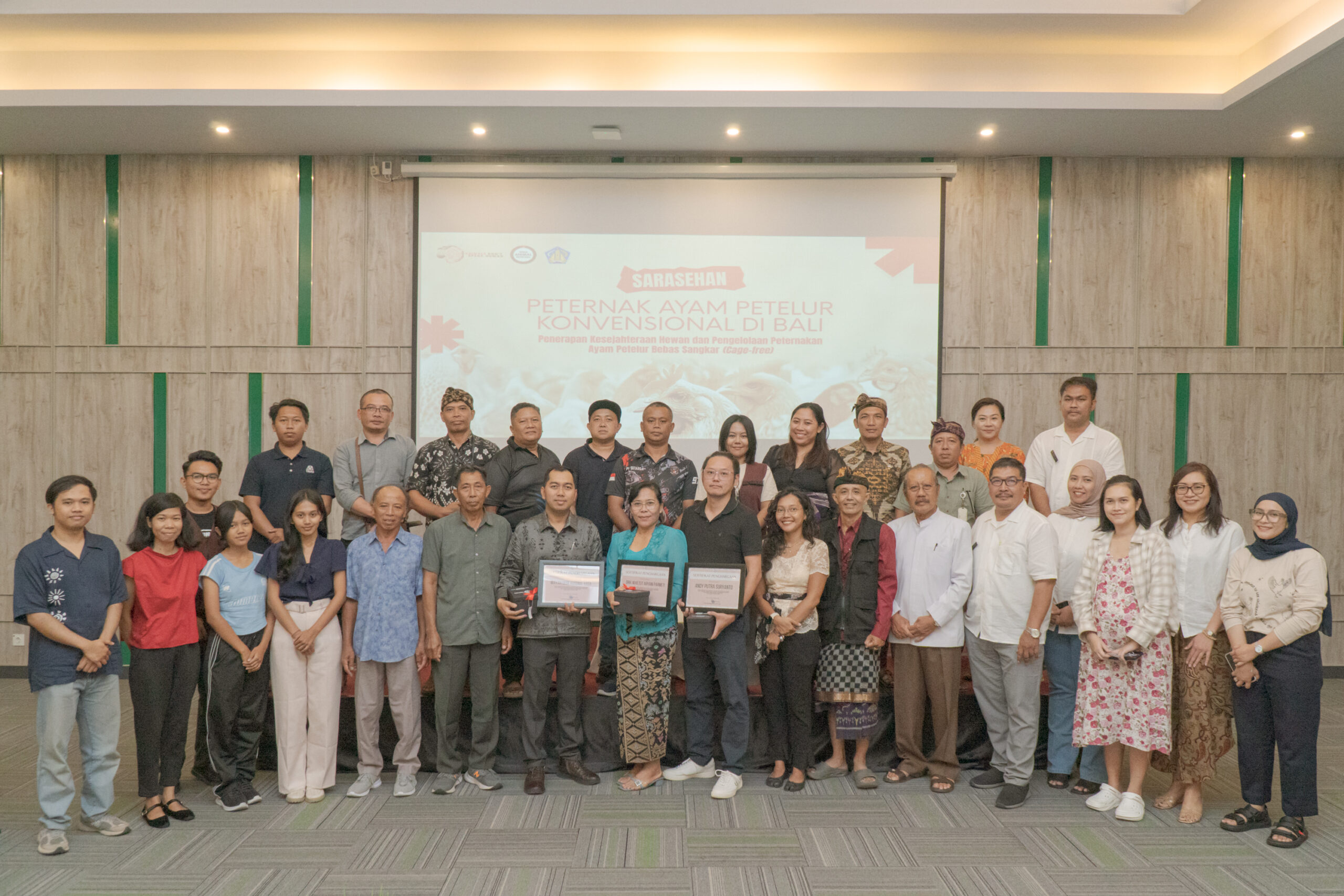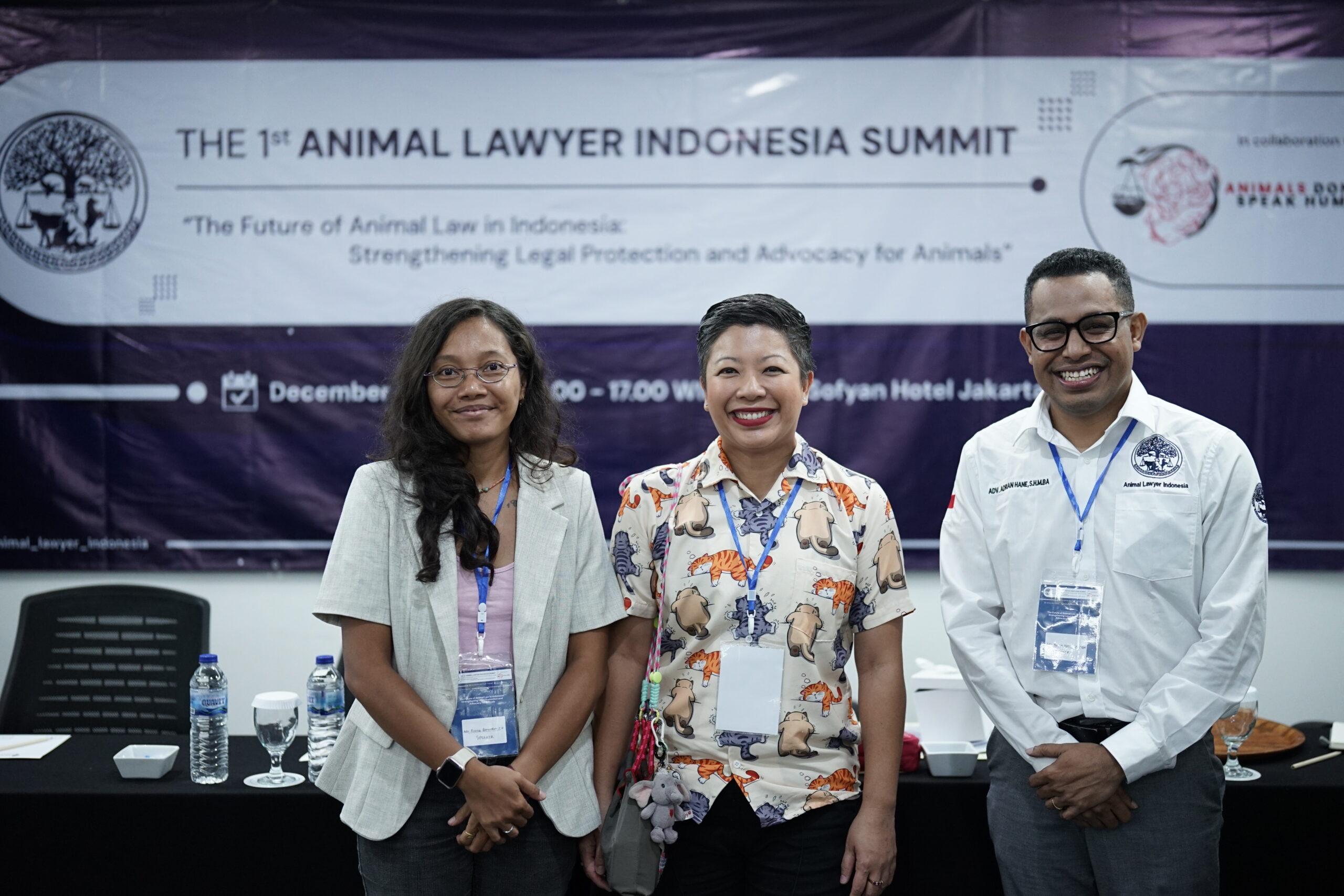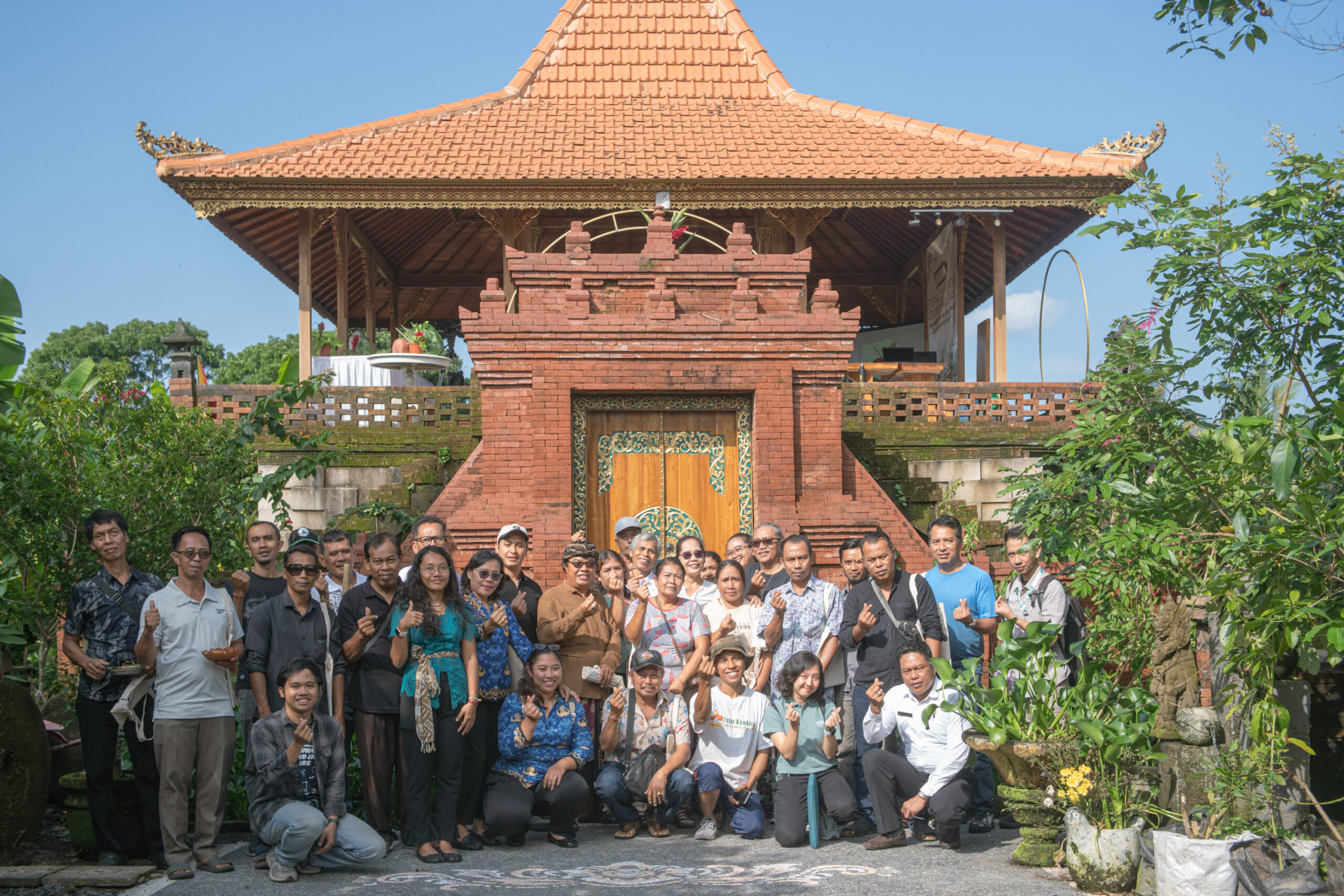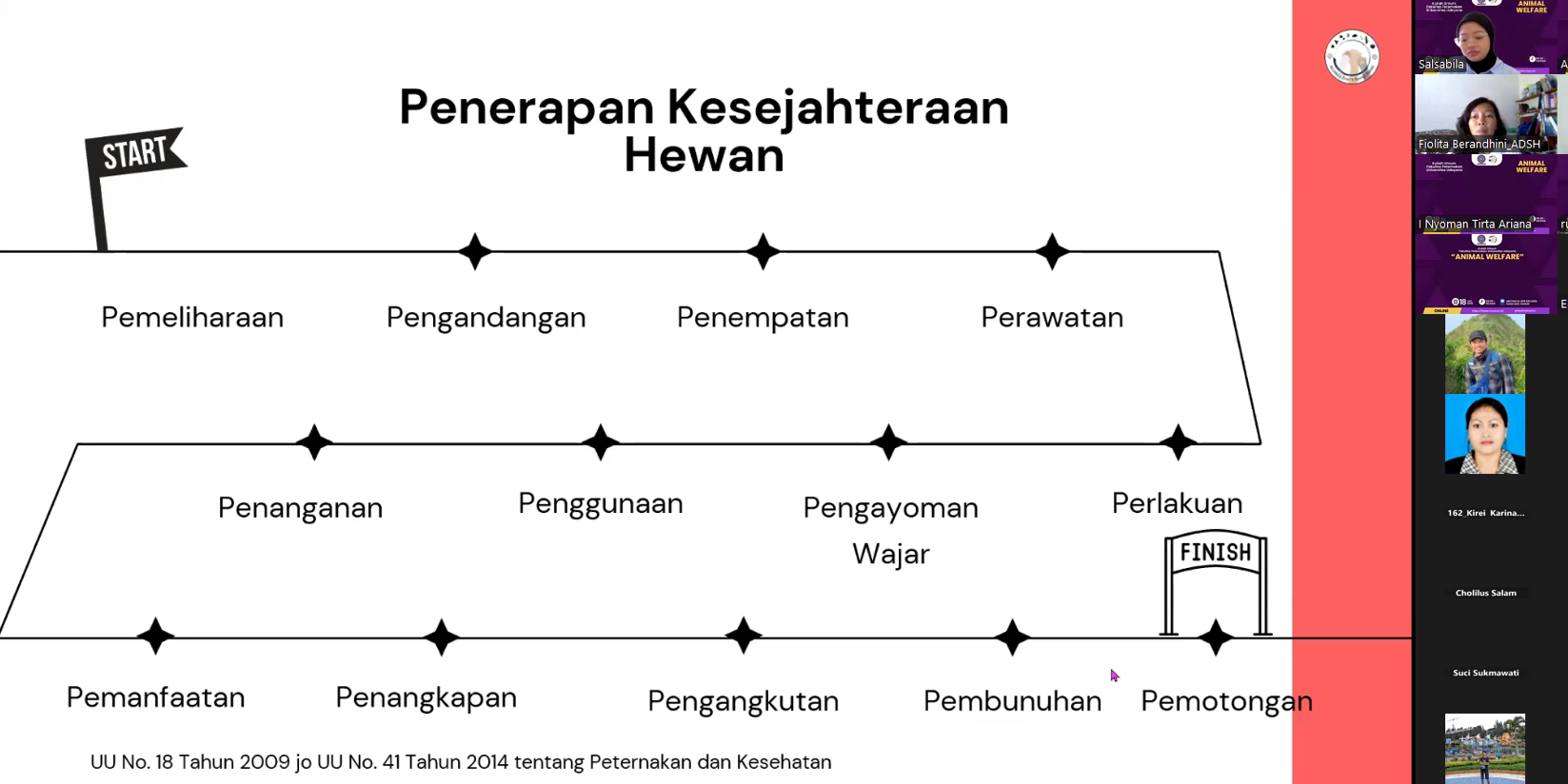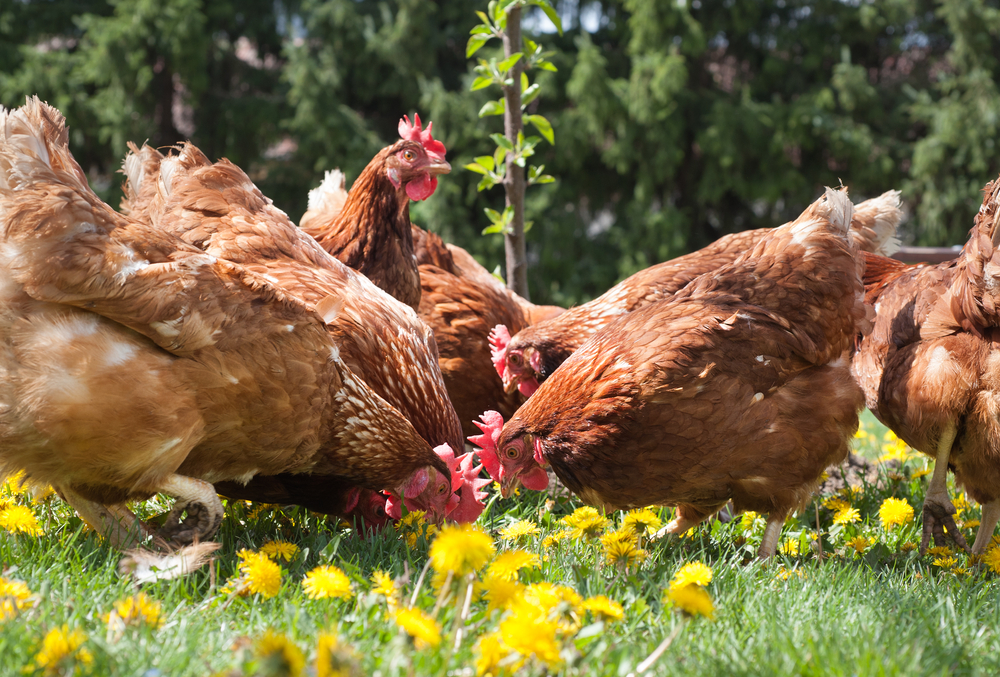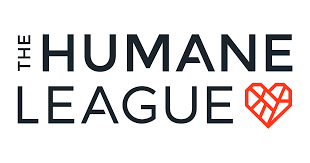(March 26, 2024, Bali) – Animal agriculture practices have a direct impact on public health and the environment, Animals Don’t Speak Human (ADSH), in partnership with the Bali Provincial Agriculture and Food Security Department, Udayana University, and World Animal Protection, encourages various stakeholders to be part of a significant role in putting laws governing animal welfare into practice for fish, pigs, broiler breeds, and layer breeds reared in Bali.
The seminar held at Udayana University, Bali – Indonesia was a soft launch of the scoping report: implementation of farmed animal welfare standards and its impact on environmental and public health in Bali. This discussion speakers was attended by Mark Dia from World Animal Protection, Fiolita Berandhini, S.H., Director of Animals Don’t Speak Human (ADSH), Drh. Ni Wajan Leestyawati Palgunasi, M.Si, from the Agriculture and Food Security Department of Bali Province and a researcher from the Faculty of Veterinary Medicine, Udayana University, Dr. Drh. Kadek Karang Agustina, MP.
This activity is an integral part of ADSH’s policy advocacy initiative, which focuses on bringing about policy shifts in Bali to emphasize animal welfare by implementing a standard framework for animal agriculture. The seminar was attended by 9 different government departments, academics, animal farmer associations, 110 students from a diverse range of multidiscipline, academics, and eight non-governmental organizations (NGOs) focused in human rights, environment, and animal protection issues. It was envisioned that each attendee will be able to provide solutions to this all-encompassing problem.
A total of 204 animal farms, including 54 pig farms, 48 broiler farms, 48 layer farms, and 54 freshwater fish farms (catfish, tilapia, and pomfret) dispersed among 9 districts in Bali, were surveyed during our study period of June to September 2023.
Our key findings in terms of animal welfare compliance are as follows:
Animal Welfare Aspects
- Pigs
Pigs cannot wander around in gestation crates, and some farms still do not provide wallowing places in their cages, which are essential for allowing pigs to express in their natural manner. These farms also overlook the dietary needs of their animals. Furthermore, a sizable portion of respondents still do tail docking and fang clipping.
Thirty-three of the 54 pig farmers we interviewed practiced tail docking, whereas 53 of the 54 implemented fang trimming.
- Broilers and layers
It was discovered that overcrowding was widespread in broiler farms. Another thing that all respondents who were visited had in common was beak cutting. While all of the responders to the poll stated that layer farms employ battery cages, which severely restrict the chickens’ range of movement and cause prolonged stress and harm. In addition, there are no enrichment elements provided by the farmer to allow the hens to express their natural behaviors, such as perching, dust bathing, comfortable space for nesting and allowing the hens to stretch their wings freely as suggested by the FARMS initiatives.
- Fish (freshwater aquaculture)
Most farmers have not paid much attention to water quality, the use of aerators which are important for fish comfort, and the control of O2 and ammonia. The provision of environmental enrichment facilities for fish was not found in any of the 54 farms visited, even though the provision of enrichment facilities for fish is as important as for other animals to have a positive effect on their welfare.
Public Health
Public health and inadequate and unmonitored compliance with animal welfare regulations are intimately related. The list of issues is further increased by the improper and excessive administration of antibiotics without veterinarian supervision. Consumers who are unaware of the consequences of anti-microbial resistance (AMR) are currently in risking to their health.
According to data from the World Health Organization, antibiotic-resistant diseasecausing bacteria (AMR) have killed 700,000 people annually; if antibiotic use is not regulated, this number is expected to rise to 10 million deaths annually by 2050 (WHO, 2019). Although the government has banned the use of antibiotics as growth promoters in farmed animals that are given inappropriately since January 1, 2018, through the Regulation of the Minister of Agriculture of the Republic of Indonesia Number 14/PERMENTAN/PK.350/5/2017 concerning Classification of Veterinary Drugs, farmers’ awareness of the risks associated with AMR is still inadequate. Managing AMR issues ismore difficult by the ease with which farmers get antibiotics from pharmacies and online retailers without a prescription, either.
The use of antibiotics in poultry farming mixed with feed or drinking water, as well as the lack of understanding of most respondents on how AMR affects consumer health, is still not a widespread concern.
Most farmers interviewed have no waste management facilities, they were known to sell rice husks, a waste product derived from litter, sold for use as agricultural fertilizer which contains antibiotic residues. The potential for cross-contamination from antibiotic residues makes this particularly worrisome.
Environmental Pollution
In addition to the animal welfare aspect, which is considered to have an impact on public health, ADSH also assesses the impact to the environment caused by poor farming practices. The 204 respondents, only 13 animal farms have waste management facilities. This means that most farmers dispose of waste directly into waterways that lead to rivers and the sea, which has a high potential to pollute the environment and endanger the health of the public and animals around the environment.
It is not advisable to sell animal excrement that contains antibiotic residues as fertilizer without first treating it. In order to prevent pollution, farmers must also be mindful of the space between their pens and populated areas. Effective management of the animal agriculture should reduce the negative effects of pollution on the environment. Therefore , the local government needs to support, oversee, and regulate agricultural businesses as best it can. Inadequate oversight by pertinent authorities may give rise to horizontal disputes within the community.
Legal compliance
Animal agriculture should comply with the standards that have been set, both related to animal agriculture licenses, waste management, and also the implementation of animal welfare as stipulated in the law. However, by the survey, we found that not all animal farms in Bali are licensed as required. Out of 204 respondents, only 114 farms have farming business licenses. The four types of farms surveyed, pig farms were the least licensed (17 out of 54 respondents surveyed).
Animal welfare is a broad concern, hence the findings of this study are crucial for crosssectoral government attention. Neglecting farmed animal welfare standards resulting disastrous consequences for the environment, public health, and Bali’s tourism industry.
Along with supporting legislation and policy, this research offers recommendations to the government for increasing the standard on animal welfare standards in order to safeguard the environment, human health, and food safety.
In presenting the scoping report at the seminar, the following six points were recommended by ADSH:
- In order to put the ideals of animal welfare into effect, legally binding guidelines for animal husbandry must be established. These criteria must be strictly enforced, with clear implementation procedures and punitive measures in place to ensure that animal suffering continues. This is an attempt to instill a strong sense of accountability in the care of animals. Following that, implementation strategies incorporating these farming standards must be coordinated with other parties’ implementation strategies.
- For instance, pig farmers must discontinue the practice of amputating tails and fangs and the usage of gestation confinement. It is possible to curtail these activities by considering animal welfare. Moreover, the role of animal nutritionists and veterinarians needs to be expanded.
- layer hen’s farmers should abandon debeaking and convert to cage-free farming methods, which let the birds exhibit their natural behaviors. Meanwhile, broiler farmers must monitor the density of hens in cages and offer enrichment features like dust baths and perches.
- Fish farmers need to improve water quality and provide enrichment facilities. The role of veterinarians and fish nutritionists is also needed.
To ensure that antibiotics are not administered improperly and that animal nutrition needs are met, all farmers require support from the government and veterinarians.
- Antibiotics that are readily accessible for purchase in stores and online must be seriously addressed right away, and those who sell them illegally must face serious penalties. This is done to prevent farmers from obtaining them without a prescription from a veterinarian. As mandated by law, the use of antibiotics in feed or drink mixes must end under monitoring; hence, farmers must undergo extensive socialization to fully comprehend the risks associated with employing antibiotics as Animal Growth Promoters (AGP).
- By establishing waste management facilities and avoiding careless disposal of waste, farmers are required to adhere to standards that ensure the environment is
not contaminated by the waste produced. It is expected that local governments and other government departments shall collaborate together to effectively carry out their respective roles in monitoring agricultural businesses that violate the law.
- In order to uphold legally protected consumer rights, public awareness regarding the risks of antibiotic residues in animal-food products derived from animals and the promotion of animal welfare must proceed. In order to motivate farmers to enhance animal welfare, consumers must be informed about healthful food options. Additionally, the government, stakeholders, and civil society organizations must work together to ensure the welfare of farmed animals altogether.
- Collaboration between the animal agriculture sector, NGOs, universities, research institutes and farmer associations is needed to improve farmers’ capacity to fulfill animal welfare.
- Farmers’ associations and businesses engaged in food of animal origin need to be involved because they have an important role in socializing the importance of fulfilling animal welfare for consumers health, as well as the prohibition of the use of antibiotics to their members.
To encourage a profound sense of responsibility in animal husbandry, we conclude that the application of animal welfare on farms in Bali needs to be improved and that legally binding guidelines are desperately needed. Then, implementation strategies incorporating these farming standards must be coordinated with other parties’ implementation strategies.
Farmed animals are sentient beings, capable of feeling pain and suffering, but also capable of feeling positive states such as pleasure and joy. Accommodating the natural behavior of farmed animals in regulations that bind farmers and food businesses of animal origin shows that a country respects the intrinsic value and welfare of animals.
***
Documentation: https://drive.proton.me/urls/X2ZTZ7TDZ0#CtSN5GPn4Dl5
Contact Person: Fiolita Berandhini, S.H, Director of Yayasan Perlindungan Hukum Satwa Indonesia, 081353917404

